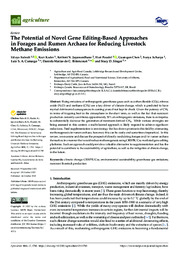The potential of novel gene editing-based approaches in forages and rumen Archaea for reducing livestock methane emissions.
The potential of novel gene editing-based approaches in forages and rumen Archaea for reducing livestock methane emissions.
Autoria: SUBEDI, U.; KADER, K.; JAYAWARDHANE, K. N.; POUDEL, H.; CHEN, G.; ACHARYA, S.; CAMARGO, L. S. de A.; BITTENCOURT, D. M. de C.; SINGER, S. D.
Resumo: Rising emissions of anthropogenic greenhouse gases such as carbon dioxide (CO2), nitrous oxide (N2O) and methane (CH4) are a key driver of climate change, which is predicted to have myriad detrimental consequences in coming years if not kept in check. Given the potency of CH4 in terms of trapping heat in the atmosphere in the short term, as well as the fact that ruminant production currently contributes approximately 30% of anthropogenic emissions, there is an impetus to substantially decrease the generation of ruminant-derived CH4. While various strategies are being assessed in this context, a multi-faceted approach is likely required to achieve significant reductions. Feed supplementation is one strategy that has shown promise in this field by attenuating methanogenesis in rumen archaea; however, this can be costly and sometimes impractical. In this review, we examine and discuss the prospect of directly modulating forages and/or rumen archaea themselves in a manner that would reduce methanogenesis using CRISPR/Cas-mediated gene editing platforms. Such an approach could provide a valuable alternative to supplementation and has the potential to contribute to the sustainability of agriculture, as well as the mitigation of climate change, in the future.
Ano de publicação: 2022
Tipo de publicação: Artigo de periódico
Unidade: Embrapa Gado de Leite
Palavras-chave: Bovino, Efeito Estufa, Gás, Mudança Climática, Pecuária
Observações
1 - Por padrão são exibidas publicações dos últimos 20 anos. Para encontrar publicações mais antigas, configure o filtro ano de publicação, colocando o ano a partir do qual você deseja encontrar publicações. O filtro está na coluna da esquerda na busca acima.
2 - Para ler algumas publicações da Embrapa (apenas as que estão em formato ePub), é necessário ter, no celular ou computador, um desses softwares gratuitos. Sistemas Android: Google Play Livros; IOS: iBooks; Windows e Linux: software Calibre.
Acesse outras publicações
Acesse a Base de Dados da Pesquisa Agropecuária (BDPA) para consultar o acervo completo das bibliotecas da Embrapa.

